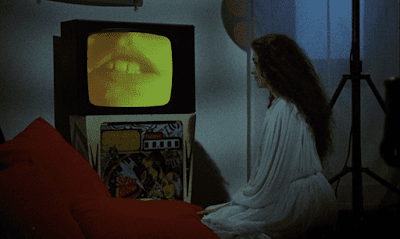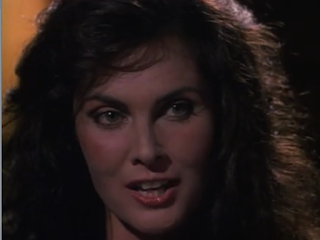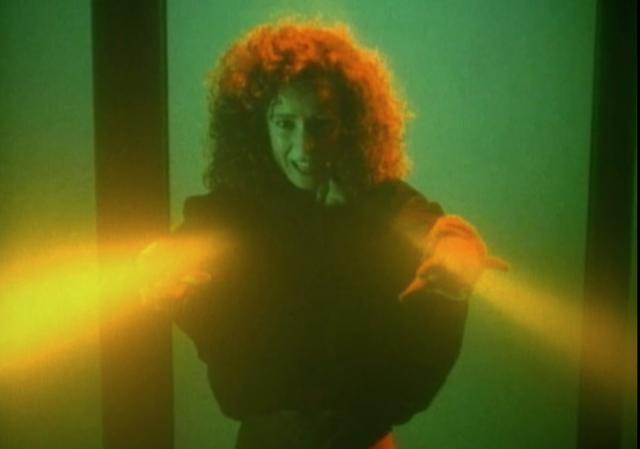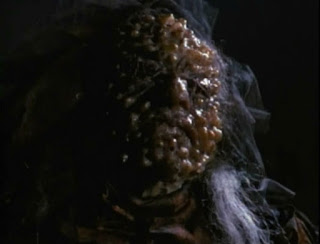
Night 55 of Acidemic's 12 Days of Ed Wood
Cozzi's/Coates' CAT hath cometh to Blu-ray last year, and you gotta see it! It's not your grandparent's Black Cat (with Karloff) it's not your drunk uncle's 941 Black Cat (with Broderick Crawford), it's not even your weird cousin's 1983 Black Cat (with Patrick Magee's hairy eyebrows menacing Mimsy Farmer). No, this is the 1989 Black Cat, aka Demons 6: Des Profundis (with everything exploding all the time), directed by Lewis Coates, aka Luigi Cozzi, aka "The Italian Ed Wood," and it's all ours. 5-eva.
Now, some people, maybe even Cozzi himself, think being called "the Italian Ed Wood" is not a compliment. They're 160 proof wrong! Like Wood's, Cozzi's best films brim with pagan innocence of narrative structure that results in giddy freedom from expectation. Both display a palpable rapture for classic horror and science fiction that's blissfully at odds with the usual Robert McKee three act structurezz and character arc-ingzzz. Everything is alive from minute to minute with the sort of giddy rapture we once got hearing our parents read us our favorite books before bedtime. That's why Plan Nine is a beloved cult treasure watched over and over, while The Day the Earth Stood Still is just a respected as a well-crafted liberal message movie even die hard sci-fi fans like me have only seen two or three times, and solely for Gort. I don't turn to my DVD collection for a feel bad-lecture about nuclear responsibility from dull paternal Michael Rennie. I turn to my DVD collection to hear Dudley Manlove rant about "Solarmanite" and our "stupid minds! Stupid!" I'd rather a movie try and fail at 'passing' as a mainstream /normal film but succeed at being niche/surreal rather than the other way around. Nothing drains the joy out of a project like groupthink and big budget competence. Wood's and Cozzi's films don't have to worry, the joy is there.
Cozzi's career may have been winding down a bit by 1989, as indeed was the drive-in era of Italian cinema as a whole, but before the 90s could begin in earnest, Cozzi gave us two parting gifts. One was Paganini Horror, it's a-verra-nice, but the other, The Black Cat is a bona fide back row meta-classic.
Initially conceived of a "Three Mothers" entry by its writer and intended star Daria Nicolodi (Dario Argento's ex-wife, she co-wrote/created Suspiria and Inferno, see Woman is the Father of Horror), Cozzi worried about displeasing almighty Dario by "choosing sides" so he refracted the story to a kind of alternate reality meta-sequel, somewhere between Targets and the Freddy's New Nightmare rather than a straight up Mother movie. This pissed off Daria, so she split the project. Yet on it went, finally erupting like a last gasp of primo 80s Italian supernatural horror/sci-fi into god knows where.
The point is, get over the total weird disjointed aspects, the all over the place narrative, and the terrible dubbing and man does it rock, howl and rattle.
 Yeah, the pustules. Validating the psychic's warning, we occasionally fade into a gross fleshy strand-covered fetus rising from its amber liquid interstellar/ transdimensional grave, maybe on the moon, (no doubt meant as a kind of reverse-evil star child from 2001: A Space Odyssey). Meanwhile, an adult Levana, with them damned pustules, begins to take over the mind of Anne, urging her to kill her own child! Just how far will Anne go to get into character?
Yeah, the pustules. Validating the psychic's warning, we occasionally fade into a gross fleshy strand-covered fetus rising from its amber liquid interstellar/ transdimensional grave, maybe on the moon, (no doubt meant as a kind of reverse-evil star child from 2001: A Space Odyssey). Meanwhile, an adult Levana, with them damned pustules, begins to take over the mind of Anne, urging her to kill her own child! Just how far will Anne go to get into character?
 Other female cast members include Luisa Manieri is the babysitter, who asks to bring her cousin along on one of her babysitting jobs. In one of the creepiest scenes, Anne comes home to find a young boy playing with her baby, only to learn the babysitter's cousin didn't come along. WHO IS THAT BOY? She runs up and he's gone! She goes into the other room where the fridge, that was supposed to have been fixed, is now overheating. The receipt from the repairman is GONE! She flashes back to a messy fridge. Is she losing her damned mind or is someone gaslighting her? The TV turns on by itself. A child is onscreen, calling her by name. Warning her about Levana: "If she takes the body of a young woman born under the sign of the sixth moon there will be no way on earth to stop her!" It explodes and showers the floor with intestines, and a glowing knife appears! That's all in like five minutes.
Other female cast members include Luisa Manieri is the babysitter, who asks to bring her cousin along on one of her babysitting jobs. In one of the creepiest scenes, Anne comes home to find a young boy playing with her baby, only to learn the babysitter's cousin didn't come along. WHO IS THAT BOY? She runs up and he's gone! She goes into the other room where the fridge, that was supposed to have been fixed, is now overheating. The receipt from the repairman is GONE! She flashes back to a messy fridge. Is she losing her damned mind or is someone gaslighting her? The TV turns on by itself. A child is onscreen, calling her by name. Warning her about Levana: "If she takes the body of a young woman born under the sign of the sixth moon there will be no way on earth to stop her!" It explodes and showers the floor with intestines, and a glowing knife appears! That's all in like five minutes.
The normal progression for these kinds of "is this bitch crazy?" type of things usually involves dream sequences, red herrings, phony staged ghosts or hanging dummies outside the window, and 'gaslit moms walking around their big houses alone, hearing noises and watching strange new gardeners through the curtains' - the sort of hackneyed stuff that would eat up a whole hour of a TV movie by Dan Curtis or Curtis Harrington. Cozzi has no patience for slow builds. He crashes a car through the wall like a ten year-old, utterly derailing the movie already in our heads, freeing us from the familiar linear shackles. So before Anne can be taken to a shrink and told it's all in her head as Marc gives her part away "for her own good," like we expect, we're plunging heedlessly into lunatic dreamtime, ever father and deeper. Weird colored lighting, an inner child filling Anne in on plot points; Anne dressing up like Levana and trying to stab her own baby; Anne actually stabbing Marc (or did she?) and fending off curvy dagger attacks by Levin's sultry personal assistant. Where is her baby!? ' The baby is gone! And as this is an Italian horror movie, there's no guarantee of the child's safety.
The story involves Italian horror power couple, director Marc (Urbano Barberini) and star Anne (Florence Guérin) and their young baby--no doubt loosely based on Argento and Nicolodi--planning a movie about a witch named Levana, not officially a "Mother" but intricately connected. Marc and Anne are tight friends with screenwriter Dan (Maurizio Fardo) and his actress wife Nora (Caroline Munro). There's also Michele Soavi as the director of the movie the women are currently working on (something to do with guns and 80s sunglasses). The go pitch the story Brett (Return of the Fly) Halsey as a Satanic, wheelchair-bound producer named Leonard. He vows he'll "create such excitement over this project that the major distributors will be cutting each other's throats to get a piece!" He sends the boys off to a psychic (Karina Hoff) who busts out her big apparently hand-written volume of Suspiria de Profundis ("not a work of fiction!" she exclaims as the Goblin Suspiria music cue briefly plays in the background). The psychic encourages Marc to change the character's name to something else. For there really was a witch named Levana and she is waiting to be reborn. Just saying her name can wake her up. Marc and David don't believe her of course, maybe Levana has already manifested in their psyches.
As in Michele Soavi's Stagefright, we're in a world where the meta and the intertextual are woven in the fabric of the narrative in a way far more deadpan and subliminal than perhaps might be discernible on first (non-DMX-enhanced) viewings. I remember catching Black Cat out of curiosity ten years or so ago--long before I discovered and fell in love with Cozzi's oeuvre-- when Netflix still had lots of weird old movies on their streaming service. It seemed kind of disjointed and needlessly gross with all the bursting green food coloring postules (ala Dèmoni) on the witch's face in lurid close-up, the intestines erupting from the TV, the terrible dubbing and fractured artsy style, but there was no getting around how unique it was. Over the years that uniqueness and abiguity has come to mean an awful lot.
 Yeah, the pustules. Validating the psychic's warning, we occasionally fade into a gross fleshy strand-covered fetus rising from its amber liquid interstellar/ transdimensional grave, maybe on the moon, (no doubt meant as a kind of reverse-evil star child from 2001: A Space Odyssey). Meanwhile, an adult Levana, with them damned pustules, begins to take over the mind of Anne, urging her to kill her own child! Just how far will Anne go to get into character?
Yeah, the pustules. Validating the psychic's warning, we occasionally fade into a gross fleshy strand-covered fetus rising from its amber liquid interstellar/ transdimensional grave, maybe on the moon, (no doubt meant as a kind of reverse-evil star child from 2001: A Space Odyssey). Meanwhile, an adult Levana, with them damned pustules, begins to take over the mind of Anne, urging her to kill her own child! Just how far will Anne go to get into character?What makes the movie such a blast is that Levana starts bending reality and the minds of all who think of her almost from the get go, including Nora, Dan, and Marc. The only question: is this the movie's reality - in all its weirdness, the movie in the movie, or Ann's dreams? We oscillate so seamlessly back and forth between them there's no point guessing which is which
As in most of his work, Cozzi's love of strong, cool women characters shines through in a way unique to Italian cinema (the only similar figure in the US is probably Roger Corman). There's usually at least one female villain in his films, as well as a strong heroine, and a string of strong cool female characters in between. Yet in the Levana script Marc and Dan are writing, there's only one woman character and she's a pustule-covered witch! (Dan's affirmation that she's "very strong" seems like a back-handed condescension) This sets up a rivalry between Nora and Anne for the part, though one wonders why on earth would either woman would want so desperately to play a part where they're covered in pustules, and why can't Marc and his writer create two female spots for their own actress wives? But, as per Cozzi, of all the women in the film, none are objectified; they're resourceful and strong, never victims. In other words, it's a strange and cryptic anti-patriarchal judgment made as far from the mire of misogyny as any 1980s Italian horror movie or indeed the world could reach. This is such a female-centric movie that when some guy who's arc was no doubt lost on the cutting room floor shows up, his presence seems very odd, shows up and gets in Caroline Munroe's car to go visit Lavana. He's dead before he even gets off a single line!
 Other female cast members include Luisa Manieri is the babysitter, who asks to bring her cousin along on one of her babysitting jobs. In one of the creepiest scenes, Anne comes home to find a young boy playing with her baby, only to learn the babysitter's cousin didn't come along. WHO IS THAT BOY? She runs up and he's gone! She goes into the other room where the fridge, that was supposed to have been fixed, is now overheating. The receipt from the repairman is GONE! She flashes back to a messy fridge. Is she losing her damned mind or is someone gaslighting her? The TV turns on by itself. A child is onscreen, calling her by name. Warning her about Levana: "If she takes the body of a young woman born under the sign of the sixth moon there will be no way on earth to stop her!" It explodes and showers the floor with intestines, and a glowing knife appears! That's all in like five minutes.
Other female cast members include Luisa Manieri is the babysitter, who asks to bring her cousin along on one of her babysitting jobs. In one of the creepiest scenes, Anne comes home to find a young boy playing with her baby, only to learn the babysitter's cousin didn't come along. WHO IS THAT BOY? She runs up and he's gone! She goes into the other room where the fridge, that was supposed to have been fixed, is now overheating. The receipt from the repairman is GONE! She flashes back to a messy fridge. Is she losing her damned mind or is someone gaslighting her? The TV turns on by itself. A child is onscreen, calling her by name. Warning her about Levana: "If she takes the body of a young woman born under the sign of the sixth moon there will be no way on earth to stop her!" It explodes and showers the floor with intestines, and a glowing knife appears! That's all in like five minutes.The normal progression for these kinds of "is this bitch crazy?" type of things usually involves dream sequences, red herrings, phony staged ghosts or hanging dummies outside the window, and 'gaslit moms walking around their big houses alone, hearing noises and watching strange new gardeners through the curtains' - the sort of hackneyed stuff that would eat up a whole hour of a TV movie by Dan Curtis or Curtis Harrington. Cozzi has no patience for slow builds. He crashes a car through the wall like a ten year-old, utterly derailing the movie already in our heads, freeing us from the familiar linear shackles. So before Anne can be taken to a shrink and told it's all in her head as Marc gives her part away "for her own good," like we expect, we're plunging heedlessly into lunatic dreamtime, ever father and deeper. Weird colored lighting, an inner child filling Anne in on plot points; Anne dressing up like Levana and trying to stab her own baby; Anne actually stabbing Marc (or did she?) and fending off curvy dagger attacks by Levin's sultry personal assistant. Where is her baby!? ' The baby is gone! And as this is an Italian horror movie, there's no guarantee of the child's safety.
Here nightmare/dreams are so indistinguishable from reality it doesn't feel like a cheat as some nightmare scenes do; there's no waking up in the dead of night screaming, no being told it was just a dream. Cozzi knows that in a movie everything is already a dream, he owes us nothing as far as 'bringing it back to reality' - he laughs at that hack pedestrian need for a normal reality through line, the type with investigating cops and patriarchal shrinks. Thus, as Marc lies dead at her feet, she hears herself in the distance telling Marc about the dream she had where she kills him. But then car comes crashing through the living room and the bloody Dan emerges. Bang Boom!
And for the fans, there are callbacks to all Cozzi's best: a bladder burst stomach effect evokes Contamination; Munro's presence evokes Starcrash; we see leftover moon shots he stole from Hercules; an inner child appearing in the TV is dubbed by the same child actress who plays the spirit guides in Hercules 2, and so on.
And for the fans, there are callbacks to all Cozzi's best: a bladder burst stomach effect evokes Contamination; Munro's presence evokes Starcrash; we see leftover moon shots he stole from Hercules; an inner child appearing in the TV is dubbed by the same child actress who plays the spirit guides in Hercules 2, and so on.
As for the music, well, even if it's not Goblin or Ennio Morricone, Vince Tempera's 'shoot for bodacious, settle for bemusing' score is certainly better than Keith Emerson's clueless melange in Argento's own Suspiria follow-up, Inferno. By 1989 Argento was himself falling into disrepair as far as his shitty music choices, leaning towards half-baked metal and away from Goblin-style clanging). Tempera keeps it all humming without trying to turn anything into a music video, and that's good enough for me.
If Cozzi's films have an Achilles' heel, it's always the English dubbing. Sometimes, if the budget allows, as with his his Hercules movies or Contamination, it's pretty good. But here and in the same year's Paganini Horror (1989) it's-a not so good-a. Worse, the one place where Nicolodi's absence is really felt is in Levana's voice. Setting the benchmark for super creepy voices with her guttural croak as Helena Markos ("you are going to die now!") in Suspiria (if you doubt it's Daria doing that laugh, just dig her throaty, evil laugh in Property is No Longer a Theft), Nicolodi would surely have nailed Levana. Instead, the actress used for Lavana's voice sounds pitch-shifted and forced. Lines like "I won't rest until I force your heart beyond the brink of madness! Hahahah" - evoke a hammy drag queen auditioning for a gig as a Disney haunted house emcee.
In the end though, Cozzi doesn't give us any time to complain about diegetic consistency: things zip along so fast and incredible we can only hold on, never daring to stop long enough to go "hey....wait a minute!" Always Jack Kirby-cosmic, Cozzi uses the meta tale of an Argento-like household being taken over by a witch only as a spring board-- broadening the aperture to include time travel, outer space, cosmic balance, witch battles, and fairy tale Jungian bedazzlement, in other words, that Cozzi Lite-Brite stardust. When a film's this great, no one should mind if it's kind of terrible. Isn't that what makes being the Italian Ed Wood the greatest "thing" in the world?
See also the Other 11 Nights of Wood, and Wood-esquery:




this is on youtube for the curious (and how could you not be after this glowing review) https://www.youtube.com/watch?v=NWgg5SLFIy8
ReplyDeleteyou turned me on to Soavi's Stagefright last year, which sounds tame compared to this - wild